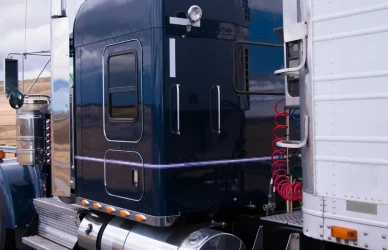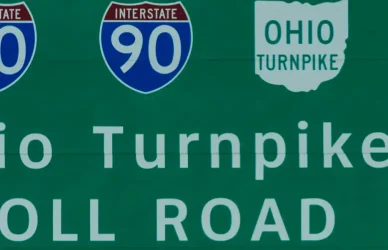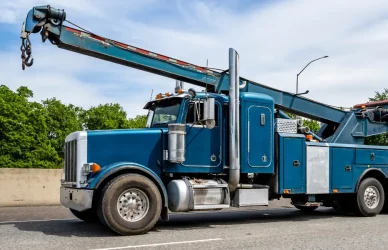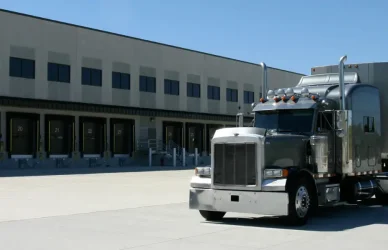The Eastern Transport Coalition has just announced the results of its global mileage-based truck pilot. This program has shed light on the potential of a mileage-based user fee (MBUF) in restoring the vital connection between usage and payment within the transportation system.
Taking place between June and November 2022, this real-world pilot involved over 250 diverse commercial vehicles, covering an impressive 8 million miles across all 48 contiguous U.S. states and four Canadian provinces. Going beyond previous initiatives, the pilot focused on unraveling the complexities of the trucking industry and exploring how an MBUF could effectively address them.
It should be noted that this pilot was carried out under the guidance of the U.S. Department of Transportation’s Surface Transportation Systems Funding Alternative (STSFA) program.
The transportation industry is changing rapidly due to advancements in technology. This has put strain on the traditional fuel tax funding model, as fuel efficiency improves and electric vehicles become more popular. Since 2018, the Coalition has been exploring the use of Mileage-Based User Fees (MBUF) as an alternative to the fuel tax. They have conducted various pilots, surveys, focus groups, and data analysis to gather information.
The Coalition does not have a biased opinion on MBUF, but their main focus is to provide decision makers with information on how all users can contribute to transportation costs.
From the start, the Coalition has recognized the importance of including the trucking industry in the conversation about MBUF. They understand the vital role the trucking industry plays in our daily lives and the economy. By bringing together stakeholders, policymakers, and industry experts, the Coalition has developed strategies that not only address the challenges faced by the trucking sector but also benefit the overall transportation network.
“Central to the Coalition’s mission is its commitment to cultivating open dialogue and transparency throughout decision-making,” said Dr. Patricia Hendren, executive director of the Coalition. “By fostering collaboration among stakeholders, the Coalition envisions pioneering innovative solutions that drive progress reflective of the complex trucking industry and the evolving needs of our transportation system.”
“Looking for dollars to support our nation’s infrastructure is not an easy task, and no stone should be left unturned,” David Heller, senior vice president of safety and government affairs for the Truckload Carriers Association (TCA) said. “However, any mechanism, including an MBUF, needs to be fully vetted to determine whether it is a viable option to consider in the future.”
“Results from this international pilot underscore the potential of MBUF as a catalyst for a transparent and scalable highway funding solution,” Hendren said. “Insights reveal the adaptability of the current motor carrier framework for MBUF implementation, demonstrating that a weight-based approach could establish a clear link between road usage and costs.
“Our work, guided by the MBUF Motor Carrier working group and MBUF Steering Committee, has shown there is an intersection between the trucking industry’s desire for uniformity, scalability, and streamlined administrative processes and our country’s need for sustainable highway funding,” she continued.
The Coalition has identified four key findings in their latest report. These findings, as outlined below, highlight the benefits and potential of MBUF. The full report can be accessed on the Coalition’s MBUF website.
- MBUF can be implemented for all commercial vehicles, regardless of their weight, fuel type, international travel, or type of operation. This offers a comprehensive approach to assess road usage and associated costs.
- Implementing a weight-based MBUF system can create a more transparent connection between usage and the cost of road use. This allows for a fair and equitable distribution of expenses based on vehicle weight.
- Achieving uniformity in MBUF implementation does not require absolute identical approaches. However, adopting scalable solutions can significantly reduce administrative costs for both motor carriers and agencies involved.
- Clearinghouse frameworks can be effectively adapted to handle MBUF systems. However, it is crucial to clearly define the roles and responsibilities of all stakeholders involved to ensure smooth and efficient implementation.
Bill Sullivan, executive vice president for advocacy at the American Trucking Associations (ATA), agrees with the Coalition’s findings.
“The Coalition’s report provides valuable insight on critical issues that must be resolved before a mileage-based user fee can be assessed on the trucking industry,” he said. “The pilot program’s findings highlight that the diversity, complexity, and interstate nature of trucking makes the imposition of a VMT (vehicle milage tax) fee a far more difficult proposition than for other vehicles. The report identifies many of these issues and provides a roadmap toward resolving the challenges that must be overcome.
“ATA will continue to support the Coalition’s efforts to identify and address the many yet unresolved barriers to implementation,” Sullivan concluded.
The President of the Owner-Operator Independent Drivers Association (OOIDA), Todd Spencer, emphasizes the Coalition’s comprehensive research takes into account the specific concerns of small trucking businesses.
“This is no easy feat. Many small business truckers are leery of anyone talking about the potential conversion to a mileage-based system to fund our highway infrastructure, largely because they fear the system will not reflect factors unique to their operations,” Spencer said.
“Over the years, (the Coalition) has demonstrated to OOIDA that understanding and addressing our members’ concerns is a critical aspect of determining the viability of MBUF. This commitment is reflected throughout their latest MBUF truck report,” he continued. “We commend (the Coalition) for producing another clear and honest report and look forward to remaining an active participant in their ongoing research and outreach.”
TCA’s Heller finds working with the Coalition on the MBUF pilot project incredibly fulfilling. He is confident that it effectively addresses the concerns of TCA members.
“TCA looks forward to being part of these essential discussions in an effort to support the Coalition’s critical work to identify and address the issues that ultimately reflect the needs of our nation’s professional truck drivers and the roads they operate on,” Heller said.
The Coalition recognizes the potential of an MBUF but acknowledges the need to address important challenges and considerations before putting it into action. Going forward, the Coalition, supported by the Surface Transportation System Funding Alternatives grant program, will prioritize conducting thorough reviews, analyzing the impact on lighter trucks and intrastate MBUFs, assessing the feasibility of consolidating fees, tackling complexities related to weight definitions, and exploring the participation of alternatively powered commercial motor vehicles.
Source: The Trucker











